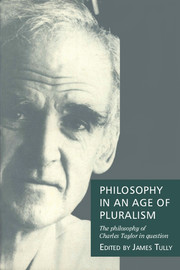Book contents
- Frontmatter
- Contents
- Notes on the contributors
- Preface
- Acknowledgements
- Introduction
- Part I Foundations
- Part II Interpreting modernity
- Part III Natural and human sciences
- 6 The strange estrangement: Taylor and the natural sciences
- 7 Is there an objective spirit?
- Part IV Philosophy in practice
- Part V Ethics, politics and pluralism
- Part VI Reply and re-articulation
- Bibliography of the works of Charles Taylor
- Index
7 - Is there an objective spirit?
Published online by Cambridge University Press: 05 June 2012
- Frontmatter
- Contents
- Notes on the contributors
- Preface
- Acknowledgements
- Introduction
- Part I Foundations
- Part II Interpreting modernity
- Part III Natural and human sciences
- 6 The strange estrangement: Taylor and the natural sciences
- 7 Is there an objective spirit?
- Part IV Philosophy in practice
- Part V Ethics, politics and pluralism
- Part VI Reply and re-articulation
- Bibliography of the works of Charles Taylor
- Index
Summary
In his book on Hegel, Charles Taylor presents the Hegelian notion of an objective spirit, and defends it against the objections to which it is commonly subjected. He does not ask us to endorse the concept wholesale. As we know, Hegel's philosophy of spirit, of which the philosophy of objective spirit forms the second part, serves a number of functions in the system. As Taylor points out, the doctrine has become most foreign to us on precisely the point which Hegel would have deemed most important, namely, when it is seen as a theodicy which makes of the human community a kind of corpus mysticum through which the divine can achieve its full presence. The concept of objective spirit does, however, possess a certain value if it is taken rather as the descendant of the notion of the ‘spirit of the laws’ which was elaborated by Montesquieu. The defence of this notion would simply be that a concept of this kind is required in the ‘moral’ or ‘social sciences’ (Geisteswissenschaften). As Taylor has remarked, however, the objections voiced by our contemporaries to the Hegelian doctrine bear not only on Hegelian theodicy, but also on the very idea of a social thought, or of a social form of thought. As faithful heirs of the Enlightenment project, many of our contemporaries believe that thought can only occur in a personal form. In other words, it is senseless, in their view, to construe thought, or meaning, or representation, etc., without implying that it is someone's thought, that of a personal thinking subject.
- Type
- Chapter
- Information
- Philosophy in an Age of PluralismThe Philosophy of Charles Taylor in Question, pp. 96 - 118Publisher: Cambridge University PressPrint publication year: 1994
- 5
- Cited by



